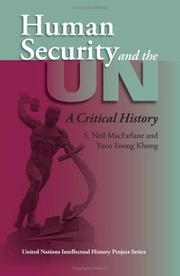| Listing 11 - 15 of 15 | << page >> |
Sort by
|

ISBN: 9786612072833 1282072838 0253111994 9780253111999 9780253347145 0253347149 9780253218391 025321839X 0253347149 025321839X 6612072830 9781282072831 Year: 2006 Publisher: Bloomington
Abstract | Keywords | Export | Availability | Bookmark
 Loading...
Loading...Choose an application
- Reference Manager
- EndNote
- RefWorks (Direct export to RefWorks)
How did the individual human being become the focus of the contemporary discourse on security? What was the role of the United Nations in ""securing"" the individual? What are the payoffs and costs of this extension of the concept? Neil MacFarlane and Yuen Foong Khong tackle these questions by analyzing historical and contemporary debates about what is to be secured. From Westphalia through the 19th century, the state's claim to be the object of security was sustainable because it offered its subjects
Security (Psychology) --- Economic security --- Internal security --- National security --- Human rights --- Security, International. --- Emotional insecurity --- Emotional security --- Insecurity (Psychology) --- Psychology, Applied --- Security, Economic --- Economic policy --- Social policy --- Welfare economics --- Security, Internal --- Insurgency --- Subversive activities --- Collective security --- International security --- International relations --- Disarmament --- International organization --- Peace --- International cooperation. --- United Nations. --- UNO --- Naciones Unidas --- Nations Unies --- ONU --- Organisation des Nations Unies --- Organizat︠s︡ii︠a︡ Obʺedinennykh Nat︠s︡iĭ --- OON --- Vereinigte Nationen --- Umot ha-meʼuḥadot --- Organizacja Narodów Zjednoczonych --- ONZ --- Forente nasjoner --- Forenede nationer --- FN --- Förenta nationerna --- Gaertʻianebuli erebi --- Organização das Nações Unidas --- PBB --- Perserikatan Bangsa-Bangsa --- Kokusai Rengō --- Kokuren --- ENSZ --- Egyesült Nemzetek Szövetsége --- Birleșmiș Milletler Teșkilâtı --- Birlăşmiş Millătăr Tăşkilatı --- Birlashgan Millatlar Tashkiloti --- BMT --- YK --- Yhdistyneet kansakunnat --- OUN --- Organizacija Ujedinjenih Nacija --- UN --- NU --- Nazioni Unite --- OSN --- Organizace spojených národů --- Sāzmān-i Milal-i Muttafiq --- Bangsa² Bersatu --- Organización de las Naciones Unidas --- Ühinenud Rahvaste Organisatsioon --- ÜRO --- Organismos tōn Hēnōmenōn Ethnōn --- Umoja wa Mataifa --- Vereinten Nationen --- Vereinte Nationen --- Hayʼat al-Umam al-Muttaḥidah --- Verenigde Naties --- VN --- Organizația Națiunilor Unite --- Um --- Lien ho kuo --- OKB --- Organizata e Kombeve të Bashkuara --- Lian he guo --- U.N. --- Umam al-Muttaḥidah --- OĒE --- Hēnōmena Ethnē --- Organizácia Spojených Národov --- Sahaprachāchāt --- Națiunile Unite --- Organizat︠s︡ii︠a︡ na obedinenite nat︠s︡ii --- Organismos Hēnōmenōn Ethnōn --- Manẓūmat al-Umam al-Muttaḥidah --- AAN --- Arhanizatsyi︠a︡ Ab'i︠a︡dnanykh Natsyĭ --- Nações Unidas --- Orhanizat︠s︡ii︠a︡ Ob'i︠e︡dnanykh Nat︠s︡iĭ --- O.Ē.E. --- ʻOngkān Sahaprachāchāt --- Sjuninejal Konob'laq --- Sāzmān-i Milal-i Muttaḥid --- Milal-i Muttaḥid --- Nėgdsėn U̇ndėstniĭ Baĭguullaga --- NUB --- Rāshṭrasaṃgha --- או״מ --- أمم المتحدة --- الأمم المتحدة --- سازمان ملل متحد --- 国際連合 --- 联合囯 --- 聯合國 --- United Nations Organization --- Liên Hiệp Quó̂c --- Liên Hợp Quó̂c --- LHQ --- Kula Samagga --- YūʼAṅʻnʻ --- 联合国 --- Организация на обединените нации --- Организация Объединённых Наций
Book
ISBN: 2828800679 Year: 2005 Publisher: Geneva Small Arms Survey
Abstract | Keywords | Export | Availability | Bookmark
 Loading...
Loading...Choose an application
- Reference Manager
- EndNote
- RefWorks (Direct export to RefWorks)
Economic relations. Trade --- Polemology --- wapenhandel --- Tajikistan
Book
ISBN: 1487537093 1487537085 9781487537098 9781487537081 9781487507855 Year: 2020 Publisher: Toronto Buffalo London
Abstract | Keywords | Export | Availability | Bookmark
 Loading...
Loading...Choose an application
- Reference Manager
- EndNote
- RefWorks (Direct export to RefWorks)
"Reflecting on the deep and complex changes in Georgian politics over the last quarter of a century, this book highlights the domestic and international developments that have shaped Georgia as a state and society. Georgia: From Autocracy to Democracy covers a wide array of topics, including the economy, elections, judicial and educational systems, relations with the EU, and Georgia's interaction with its regional neighbours, including Russia, Turkey, and Iran. In the book, Georgian policy-makers, practitioners, and scholars who have worked in the administration, in the opposition, in the Third Sector, and in academia provide first-hand perspectives on Georgia's political and economic life. They demonstrate unusual insight into the extraordinary transformations in Georgia over the last twenty-five years, from the authoritarianism of President Gamsakhurdia, through the experience of civil war in the 1990s, to democracy today."--
Georgia (Republic) --- Social conditions. --- Economic conditions. --- Politics and government --- EU. --- Georgia. --- Georgian-Russian relations. --- Georgian. --- South Caucasus. --- Soviet Union. --- economy. --- elections. --- higher education. --- history. --- judicial reform. --- politics.
Book

ISBN: 9781501738012 Year: 2019 Publisher: Ithaca, NY
Abstract | Keywords | Export | Availability | Bookmark
 Loading...
Loading...Choose an application
- Reference Manager
- EndNote
- RefWorks (Direct export to RefWorks)
Book

ISBN: 9781685858346 1685858341 Year: 2023 Publisher: Boulder
Abstract | Keywords | Export | Availability | Bookmark
 Loading...
Loading...Choose an application
- Reference Manager
- EndNote
- RefWorks (Direct export to RefWorks)
Positing an "insecurity dilemma," in which national security, defined as regime security by state authorities, becomes pitted against the incompatible demands of ethnic, social, and religious forces, this book addresses the problems and prospects for security in the Third World in the 1990s.
| Listing 11 - 15 of 15 | << page >> |
Sort by
|

 Search
Search Feedback
Feedback About UniCat
About UniCat  Help
Help News
News